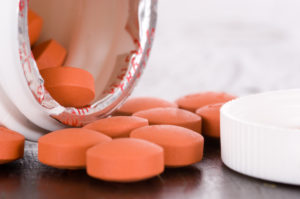 There’s a good chance when your temperature rises, or your body starts to hurt, you reach for ibuprofen. Most do.
There’s a good chance when your temperature rises, or your body starts to hurt, you reach for ibuprofen. Most do.
But doing it daily could be far less safe than you believe. In fact, it could be flat-out dangerous.
Advertisement
Ibuprofen is a common over-the-counter (OTC) medication sold under names like Advil and Motrin. It is a nonsteroidal anti-inflammatory (NSAID) that works by stopping inflammatory responses that cause swelling, pain, and fevers.
Just because it’s sold on store shelves, however, doesn’t mean it’s safe. Especially when taken daily. Here are some of the health risks associated with regular ibuprofen/NSAID use.
Stomach Pain: Taking ibuprofen on an empty stomach may lead to abdominal pain, diarrhea, and other stomach troubles. There is research suggesting continued use of NSAIDs could cause significant gastrointestinal bleeding.
Some can even experience discomfort when taking these medicines with food, especially if taken multiple times per day for extended periods.
Stroke Risk: Overuse of NSAIDs might increase your risk for a stroke. Although the mechanisms that lead to a higher stroke risk are undetermined, it’s better to be safe than sorry.
Stick to recommended usage guidelines and avoid using for multiple days in a row unless specifically instructed otherwise by your doctor.
Impaired Kidney and Liver Function: These medications could also put a beating on a couple of your most important organs. Your kidneys and liver are instrumental in removing toxins from the body, hormone production, and overall health.
The National Kidney Foundation says that habitual extended use of ibuprofen and other NSAIDs can lead to inflammation between kidney tubules to impair function.
Advertisement
Most people should be okay if they stay to recommended usage protocols, with the possible exception of people with exiting kidney problems.
Research has also shown that even moderate doses of ibuprofen may contribute to permanent liver damage.
In short, don’t rely on ibuprofen to regularly relieve your pain. Instead, focus on lifestyle interventions and more sustainable pain-reduction methods.
